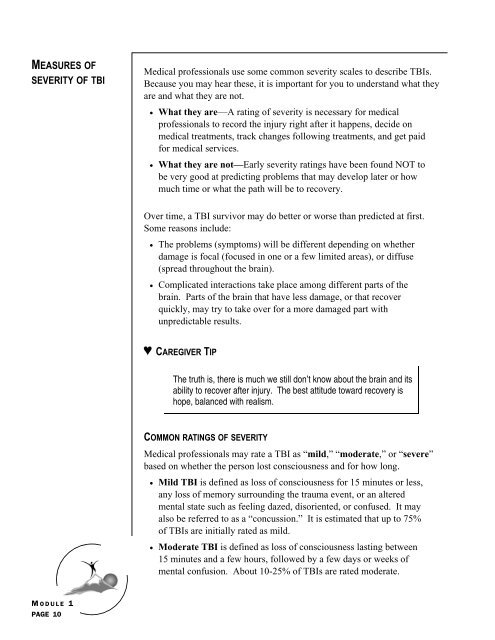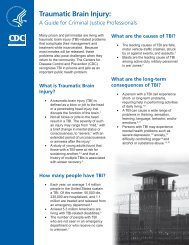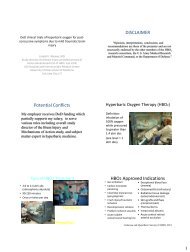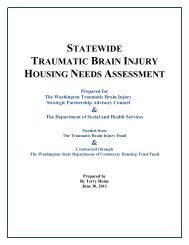caregiver tip - Traumatic Brain Injury Council
caregiver tip - Traumatic Brain Injury Council
caregiver tip - Traumatic Brain Injury Council
Create successful ePaper yourself
Turn your PDF publications into a flip-book with our unique Google optimized e-Paper software.
MEASURES OF<br />
SEVERITY OF TBI<br />
Medical professionals use some common severity scales to describe TBIs.<br />
Because you may hear these, it is important for you to understand what they<br />
are and what they are not.<br />
• What they are—A rating of severity is necessary for medical<br />
professionals to record the injury right after it happens, decide on<br />
medical treatments, track changes following treatments, and get paid<br />
for medical services.<br />
• What they are not—Early severity ratings have been found NOT to<br />
be very good at predicting problems that may develop later or how<br />
much time or what the path will be to recovery.<br />
Over time, a TBI survivor may do better or worse than predicted at first.<br />
Some reasons include:<br />
• The problems (symptoms) will be different depending on whether<br />
damage is focal (focused in one or a few limited areas), or diffuse<br />
(spread throughout the brain).<br />
• Complicated interactions take place among different parts of the<br />
brain. Parts of the brain that have less damage, or that recover<br />
quickly, may try to take over for a more damaged part with<br />
unpredictable results.<br />
♥ CAREGIVER TIP<br />
The truth is, there is much we still don’t know about the brain and its<br />
ability to recover after injury. The best attitude toward recovery is<br />
hope, balanced with realism.<br />
COMMON RATINGS OF SEVERITY<br />
Medical professionals may rate a TBI as “mild,” “moderate,” or “severe”<br />
based on whether the person lost consciousness and for how long.<br />
• Mild TBI is defined as loss of consciousness for 15 minutes or less,<br />
any loss of memory surrounding the trauma event, or an altered<br />
mental state such as feeling dazed, disoriented, or confused. It may<br />
also be referred to as a “concussion.” It is estimated that up to 75%<br />
of TBIs are initially rated as mild.<br />
• Moderate TBI is defined as loss of consciousness lasting between<br />
15 minutes and a few hours, followed by a few days or weeks of<br />
mental confusion. About 10-25% of TBIs are rated moderate.<br />
M ODULE 1<br />
PAGE 10






